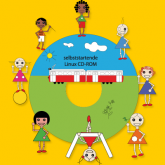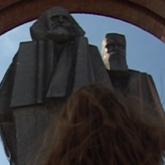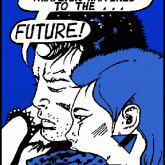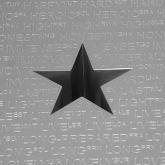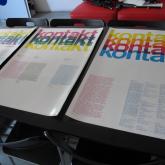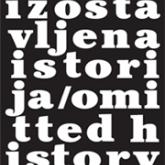Week 48: kuda.org
Hi Everyone,
This Tuesday is another event in a year-long series of weekly conversations and exhibits in 2010 shedding light on examples of Plausible Artworlds.
This week we’ll be talking with Branka Curcic and Zoran Pantelic of new media center_kuda.org, an independent organization in Novi Sad, Serbia, which brings together artists, media activists, and researchers interested in the political uses, creative misuses and social repurposing of free and open information and communications technologies.
“Kuda” means “where to?” and that open-ended query is pretty much the conversation-starter that underlies all the organization’s activities and programs. Initially, the question was quite literally about the world in which the small media center was trying to emerge. Its current day offices, and former activities space, is situated between a post office and a fishmonger in an industrial working class neighbourhood far from the city center. The original set of old computers that made up the center’s internet café were discarded Bavarian government machines from the 1990s, picked up by kuda.org director Zoran Pantelic, who hauled them to Serbia shortly after the NATO air raids, reconfiguring them all with Linux operating systems. Those prehistoric beasts now stand on a selfmade bar in one of the rooms of the center. Today as before, for all visitors to kuda.org, Internet access (on much newer machines!) is as free as a free beer.
Kuda.org’s work focuses on questions concerning the interpretation and analysis of the history and significance of the information society, the potential of information itself, and its influence on social policy making. New Media Center_kuda.org opens space for both cultural dialog and alternative methods of education and research through a series of programs, including kuda.lounge (a series of presentation, talks and lectures — some 100 events since 2000), kuda.info (providing free internet access), kuda.production (a matrix for publishing and exhibition) as well as offering free bandwidth to artists and activists.
Clearly, the world in which Kuda.org operates is utterly at odds with the mainstream political, cultural and artistic landscape of post-Socialist Yugoslavia and contemporary Serbia — a lifeworld adverse and often hostile to the types of practices kuda.org thinks of as “art”. Looking at kuda.org’s track record, one cannot but wonder whether worldmaking is not inevitably informed by a performative “where-to” logic. But at the same time, kuda.org has provided a platform for assembling answer’s to its eponymous question — one that seeks to extract its own consistency from the components of the assemblages which it has produced. The enduring question is how to do just that over the long term — how to assemble plausible collectivities that function as counter-currents against all the seductions of fall-back positions, become aware of their own pitfalls and blindspots, while finding ways to realize their potential, risking themselves in the face of others.
